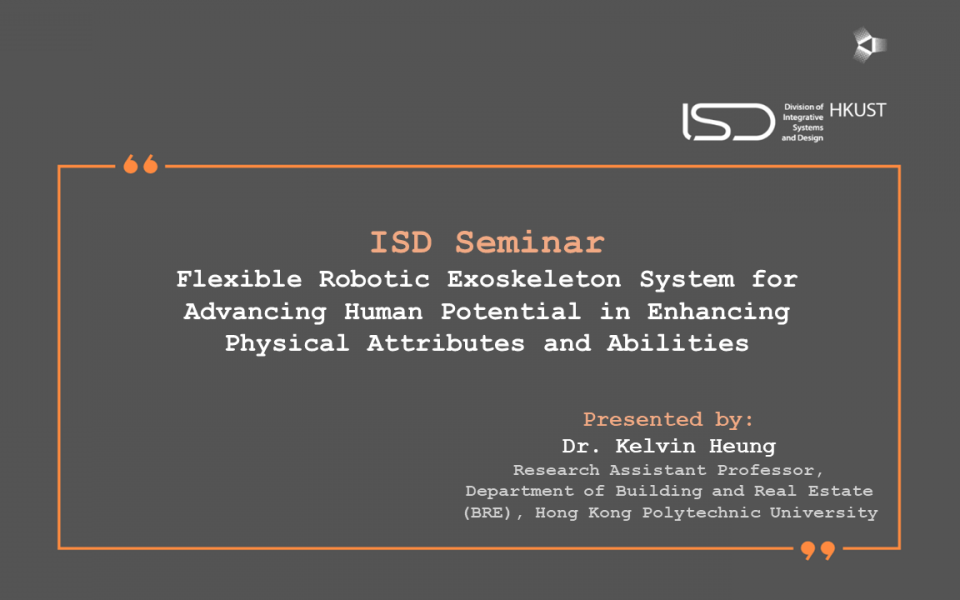ISD Seminar - Designing Mechanical Intelligence in Magnetic Robots
Supporting the below United Nations Sustainable Development Goals:支持以下聯合國可持續發展目標:支持以下联合国可持续发展目标:
Robotic exoskeletons are advanced wearable devices designed to enhance the capabilities of disabled patients and manual laborers engaged in routine heavy manual work. These exoskeletons incorporate powered assistance and support mechanisms, enabling users to experience improved limb movement, strength, and endurance. Active rigid exoskeletons, commonly employed in this context, consist of a stiff frame or structure worn over the body. They are integrated with rigid actuators such as electric motors or hydraulic/pneumatic systems, which provide direct assisting torques to facilitate an augmented range of motion (ROM) for the body joints. However, the limited adoption of wearable robotic exoskeletons among different communities can be attributed to issues such as bulkiness, lack of optimal control algorithms, heavy weight, and inadequate interaction with user intent. Current exoskeleton devices are burdened by their weight (up to 30 kg) due to powerful motors and complex rigid structures. This additional load consumes more metabolic power and hinders natural human movement. An example study of wearing a 15 kg exoskeleton to carry loads ranging from 20 kg to 55 kg had led to an increase of oxygen consumption level from 41% to 60% compared to without exoskeletons. Furthermore, existing exoskeletons typically rely on pre-programmed actuation trajectories, which create impedance and hinder users from comfortably performing various physical tasks while maintaining natural body movement. These limitations compromise mobility, comfort, and the potential for real-time monitoring and interaction with changing surrounding conditions. Our research aims to develop compact and lightweight exoskeletons with an adaptive controller specifically designed to enhance the capabilities of people using exoskeleton devices. The focus is on creating exoskeletons that provide assisting torques aligned with user intent through matching of patterns. By addressing challenges such as weight, flexibility, comfort, and safety, the goal is to create exoskeleton designs that minimize metabolic burden, optimize ROM, align with natural human movement, and ensure user safety. This human-centered research aims to improve the lives of underprivileged individuals facing health challenges, making a significant societal impact, and empowering them to lead healthier, more fulfilling lives. Through scientific advancements in lightweight and adaptive exoskeleton technology, this research aims to improve task performance, reduce physical strain, and enhance overall quality of life (QoL) for the intended users.
Dr. Heung is presently serving as a Research Assistant Professor in the Department of Building and Real Estate (BRE) at the Hong Kong Polytechnic University (PolyU). He attained his bachelor and doctoral degrees in Biomedical Engineering from the Chinese University of Hong Kong in 2016 and 2020, respectively. Dr. Heung has also held the position of postdoctoral fellow at the Department of Rehabilitation Sciences in PolyU as part of the RGC postdoctoral fellowship scheme in 2022. Dr. Heung's research primarily focuses on advancing the field of lightweight, compact, and portable robotic exoskeletons, with a specific emphasis on human mobility augmentation. His research aims to improve the lives of individuals facing health challenges, particularly those from underprivileged backgrounds. His specialization lies in the investigation of human-robot interactions, encompassing the domains of mechanical structural design, computational modeling, and control algorithms. His work is centered on the development of exoskeleton systems that adapt to the natural characteristics of human beings, thereby enhancing the efficacy and compatibility of human-robot interactions. Dr. Heung has authored multiple publications in international conferences and peer-reviewed academic journals and received numerous local and international awards for his research outcomes. He was honored with the "Young Innovative Researcher Award 2023" at PolyU, recognizing his research excellence and global contributions. As a Principal Investigator (PI), he has led several research projects, including the Chief Executive Policy Unit (CEPU) Public Policy Research (PPR) Scheme, RGC Postdoctoral Fellowship Scheme (RGC – PDFS), and so on. Dr. Heung also co-founded the startup "Fleming MedLab Limited" for stroke rehabilitation exoskeletons, listed on Forbes Asia 100 in 2023 and received silver award in HKUST-Sino One Million Dollar Entrepreneurship Competition in 2023.
Please contact us if you have any question via isd@ust.hk or on 3469 2723.
